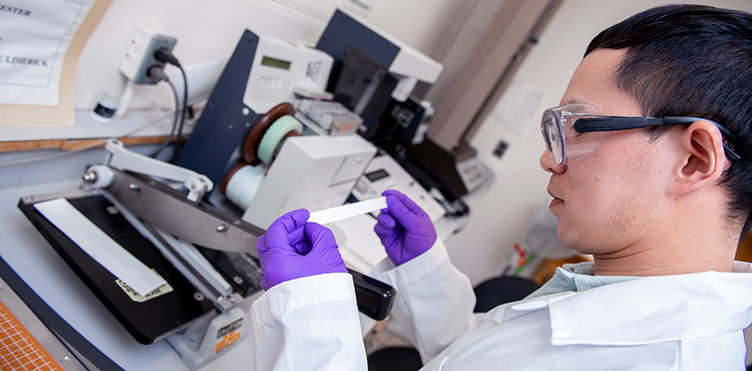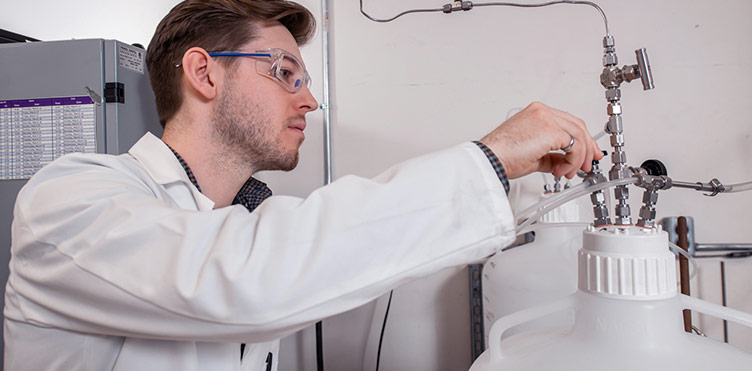Graduate programs

Get ready to create solutions
Whatever the field and the problem, our graduate students work to generate results. Health, energy, manufacturing and environmental care are possibilities for your future. Join us to unlock the secrets of the elements to make a better world.
UNB Engineering places in the top 20 per cent of engineering faculties worldwide in the Times Higher Education rankings (2024). We offer:
- internationally known researchers who will guide your work
- a smaller campus in the friendly city of Fredericton in New Brunswick
- the ability to get to know your professors and fellow students
- the promise that you will never be just a number or a face in the crowd

Our research
Outstanding faculty research and research centres support our graduate programs. You will work with innovative faculty members to explore the mysteries of matter to shape a better future.
Centre for Nuclear Energy Research (CNER)
The Centre for Nuclear Energy Research leads global research into nuclear energy specializing in water chemistry control and corrosion detection, monitoring, and prevention.
Their research facility contributes to new advanced nuclear technologies. They partner with industry leaders to deliver applied research products and services.
Limerick Pulp & Paper Research and Education Centre
Pulp and paper have been around a long time but there is always improvement to be made to the process and outcomes. This group goes far beyond everyday paper.
This internationally-renowned group develops biofuels, green cellulosic products, hemicelluloses and extractive-related biochemicals and materials.
Our people are global leaders
In addition to research centres, faculty members at CHE are actively engaged in essential work promoting decarbonization and industry transformation.
- Dr. Felipe Chibante leads on nanomaterials
- Dr. William Cook conducts vital research on advanced nuclear technologies
- Dr. Mladen Eic investigates diffusivities in gas mixtures and composite materials
- Dr. Zhibin (Ben) He seeks to improve pulp and paper by exploring natural product chemistry
- Dr. Brian Lowry works on fluid mechanics and rheology
- Dr. Yonghao Ni improves the pulping and bleaching process for refining pulp and paper products
- Dr. Olga Palazhchenko explores issues around corrosion and nuclear generation
- Dr. Kyle Rogers zeros in on energy and environment by researching biomass and biofuels
- Dr. Laura Romero-Zeron works on biodiesel and green diesel from bio-resources
- Dr. Kripa Singh focuses on water health and wastewater management in a joint appointment with CE
- Dr. Huining Xiao explores polymers including biodegradable polymers for packaging

Graduate programs in CHE
MEng | Master of Engineering
The MEng in chemical engineering is a 12-24 month practical program intended for those who plan to make their careers in industry. This degree is attractive to those in industry and government who are interested in studying part-time.
The degree is course-based. It requires successful completion of an approved 30 credit hour program drawn from the three core areas of study important to all chemical engineers working in industry:
- engineering & environmental science
- business and management
- chemical engineering
The MEng degree is not a terminal degree. Students who successfully complete the MEng are eligible for admission to the PhD program on a competitive basis.
MScE | Master of Science in Engineering
The MScE degree requires successful completion of a research thesis and an approved course program of 16 credit hours. The course program must include the seminar course (CHE 6800-CR), and Introduction to Research Methodologies (CHE 6511 - 3 ch).
PhD | Doctor of Philosophy
The PhD degree requires successful completion of a research thesis and an approved course program of 9 credit hours. The course program must include the seminar course (CHE 6800-CR), and Introduction to Research Methodologies (CHE 6511 - 3 ch).
The PhD program is typically entered following completion of a research master's program. You are required to present a research proposal and successfully complete the research proposal course. Candidates must also pass a comprehensive examination covering the major areas of chemical engineering within the first year of study.
PhD candidates are required to take two courses (6 ch) at the 6000 level in addition to CHE 6511 and CHE 6800. The courses must be approved by the student's supervisor and may include courses outside of chemical engineering.
Normally, candidates for the PhD should hold a master's degree in chemical engineering or an appropriate related discipline.
A student who holds a recognized bachelor's degree is generally admitted, initially to the MScE program. The student may then transfer directly to the PhD program, without writing the MScE thesis, after successful completion of the MScE course program, the comprehensive examination, and successful presentation and defense of a detailed research proposal for the thesis project.
For the comprehensive examination, candidates are required to choose two areas from the following list:
- heat transfer
- mass transfer
- reaction engineering
- thermodynamics
- process dynamics/control
- unit operations
Written examinations are set in the same day. Candidates may also be asked to defend their papers orally.
In addition to the university oral, each PhD candidate is required to pass a departmental oral examination. Candidates are examined primarily on areas related to their research but must be prepared to also answer questions of a general nature.
Quick facts
- Degrees offered: MEng, MScE, PhD
- Application deadline: open
- Study options: course-based, thesis-based
- Duration: 1-2 years for the MEng, 2 years for the MScE, 4 years for the PhD
- Entry terms: September and January
You can also do co-op work terms to enhance your professional credentials and advance your career.
What it takes to join us
- If you are interested in research and a thesis, indicate your research interest on your application.
- If you are from Canada or the United States you should have an undergraduate degree with a minimum GPA 3.0 (B or 70%). International applicants must have a GPA Canadian equivalent to 90% or higher. Applicants to the PhD program normally hold a master's degree from an accredited university.
- You must submit a complete application that includes three references and a one-page statement that describes your research interests.
- International applicants whose first language is not English must submit language scores.
- TOEFL - minimum score of 580, and a TWE score of 5.0. Computer-based scores would be 237 and 5.0 or greater. Internet score of 94. Writing and speaking score a minimum of 22
- IELTS - minimum score of band 7
- MELAB - minimum score of 85
- CanTest - minimum score of band 4.5
- PTE - minimum score 65
Contact Dr. Brian Lowry, Director of Graduate Studies or Sylvia Demerson, Program Secretary, for more information at 506-453-4520.
